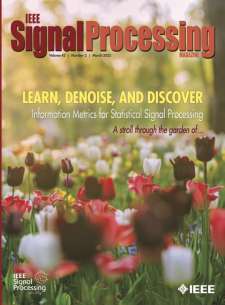Automation Is Coming to Research
Top Reasons to Join SPS Today!
1. IEEE Signal Processing Magazine
2. Signal Processing Digital Library*
3. Inside Signal Processing Newsletter
4. SPS Resource Center
5. Career advancement & recognition
6. Discounts on conferences and publications
7. Professional networking
8. Communities for students, young professionals, and women
9. Volunteer opportunities
10. Coming soon! PDH/CEU credits
Click here to learn more.
Automation Is Coming to Research
The rapid advancement and proliferation of information and communication technologies in the past two decades significantly impacted how we do research. The research process has been digitalized and is increasingly relying on growing computing power and storage capacity to gather and process a constant production of data—our observations of systems and phenomena we would like to understand, control, and improve. To turn these observations into useful knowledge, findings, discoveries, and better decisions, the data needs to be intelligently processed, and the results of such processing suitably visualized.
In research communities, the process of obtaining, processing, and visualizing data to yield new insights is usually captured and shared through scientific papers, which normally cite other papers to connect new and previous findings. This creates an intricate web of interlinked papers comprising most of our scientific knowledge. This web is growing exponentially, so it is increasingly more difficult to search and navigate. It is also not easy to validate all published results, and we may often rediscover things that are already known.
New Robots - A new, much more intelligent system to significantly improve the efficiency of capturing, storing, and utilizing scientific knowledge is needed—and signal processing can help. Signal processing can be used to devise special robots that can crawl the web of papers the same way as Google robots map the Internet. The papers robots can tell us what is already known and in exactly what papers, so we can avoid rediscovering known things and wasting precious research resources. The papers robots could be programmed to automatically summarize targeted papers, categorize and recommend them, generate surveys about specific research topics, depict how the research ideas evolved over time, and even identify the emerging research trends. Such robots would become more than just research tools for increasing our efficiency and productivity. These robots may soon be able to recommend solutions to the research problems being given and even suggest the research problems that may be useful to consider.
Some types of papers robots already exist, although they are still not exploited widely in research labs. The papers robots can develop their knowledge extraction and information processing capabilities mainly due to their extensive use of natural language processing, text mining, deep learning and other advanced methods of data processing, machine learning, and artificial intelligence. For instance, machine learning to automate the understanding of research papers is facilitated by a well-established structure of these papers, so they can be seen as structured data objects of well-defined elements including title, abstract, introduction, methodology, results, discussion, and conclusion sections.
Moreover, the research methodologies that are used to produce scientific papers often mature over time—another fundamental feature that the research robots could exploit. The established research patterns could be learned or discovered and then utilized to define research templates to further promote the research automation. The research templates are analogous to the document templates used, for example, in the text processing software that many people have installed on their personal computers. With the research templates, the research process can be transformed into a problem of specifying the desired combinations of template inputs while constraining desirable solutions.
SPS Social Media
- IEEE SPS Facebook Page https://www.facebook.com/ieeeSPS
- IEEE SPS X Page https://x.com/IEEEsps
- IEEE SPS Instagram Page https://www.instagram.com/ieeesps/?hl=en
- IEEE SPS LinkedIn Page https://www.linkedin.com/company/ieeesps/
- IEEE SPS YouTube Channel https://www.youtube.com/ieeeSPS













